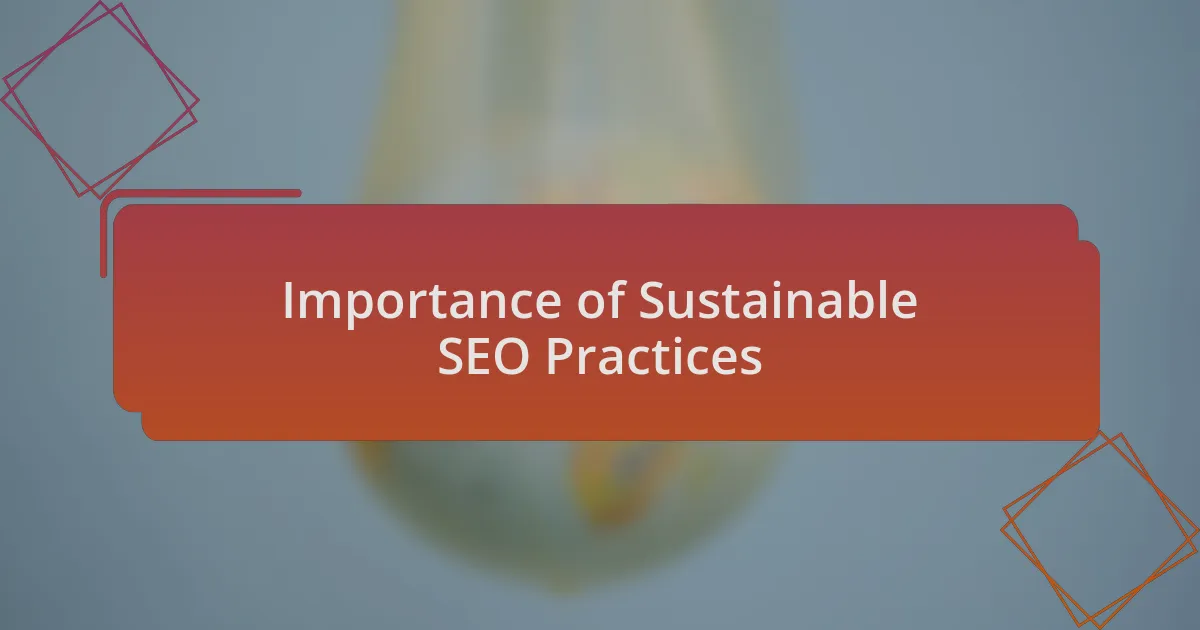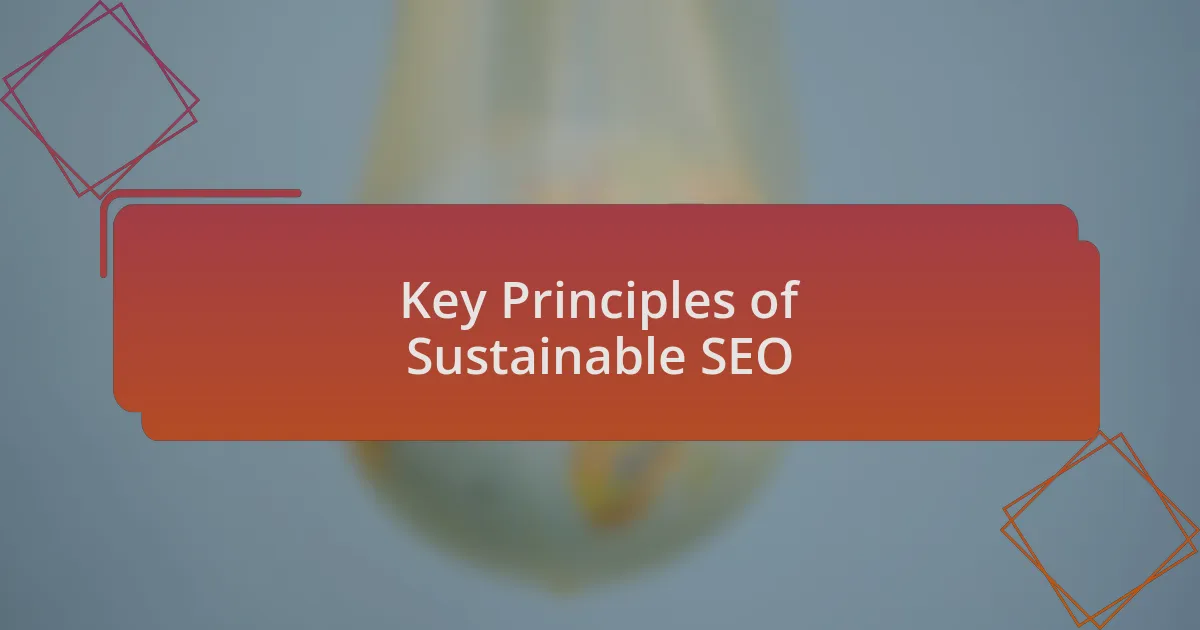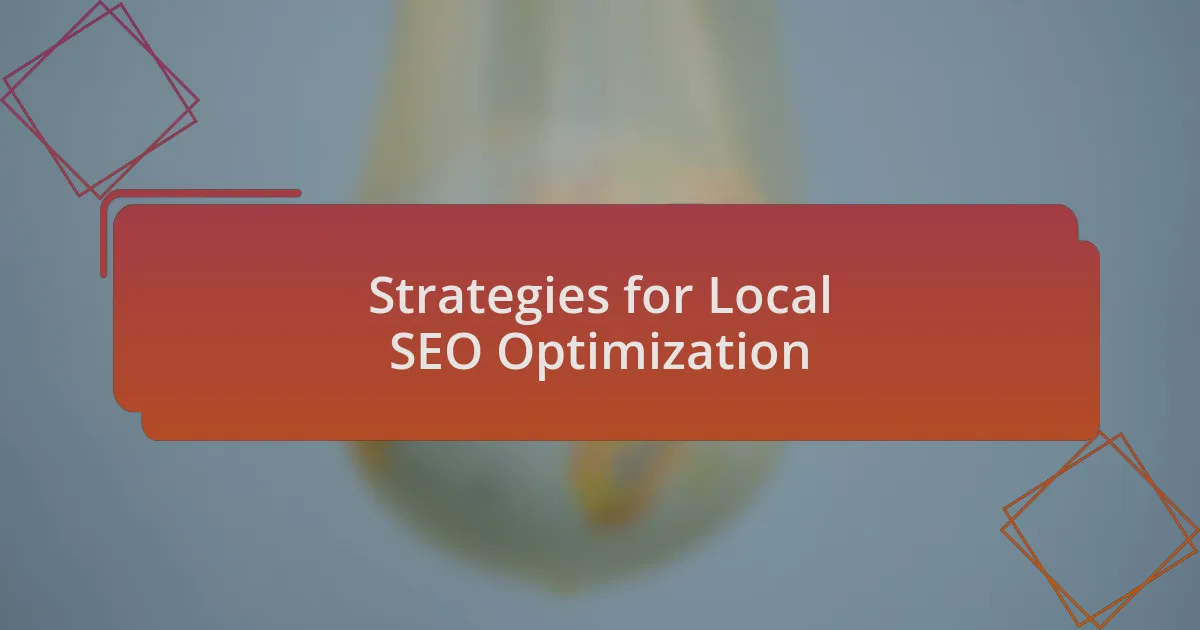Key takeaways:
- Local SEO emphasizes the importance of appearing in relevant searches to attract customers in specific geographical areas.
- Sustainable SEO practices, focused on quality content and user experience, foster long-term growth and community credibility.
- Key strategies for local SEO optimization include optimizing Google My Business, actively managing customer reviews, and creating neighborhood-specific content.
- Utilizing tools like Google Analytics and SEMrush helps measure SEO success by analyzing user behavior and tracking keyword performance.

Understanding Local Search Engine SEO
Local search engine SEO focuses on optimizing a business’s online presence to attract more customers in specific geographical areas. I remember the first time I encountered local SEO while trying to find a coffee shop near me. I felt the frustration of scrolling through results that were miles away, which made me realize how crucial it is for businesses to appear in local searches.
When I started implementing local SEO strategies for my own blog, I was amazed by how effective they could be. Using tactics like geotagging images and creating location-specific content transformed my site’s visibility. Have you ever noticed how easily you can find local stores with just a few keywords? That’s the power of local SEO at work.
In local search, it’s not just about ranking high; it’s about relevance and connection to your community. I vividly recall a time when a local bakery shared a story about their ingredients sourced from nearby farms. This emotional connection not only resonated with me but also boosted their visibility in local searches, proving how storytelling can enhance local SEO efforts.

Importance of Sustainable SEO Practices
Sustainable SEO practices are essential because they foster long-term growth and resilience in an ever-evolving digital landscape. I recall when a friend of mine decided to overhaul his entire website based on short-term trends. Unfortunately, that led to a rollercoaster of ranking fluctuations, causing him stress and wasted resources. Embracing a sustainable approach means focusing on quality content and user experience, which ultimately builds trust and loyalty over time.
Adopting sustainable SEO not only boosts visibility but also enhances credibility within a community. I once came across a local gardening shop that regularly shared helpful, seasonal tips for plant care on their blog. Their commitment to genuine, informative content attracted a dedicated following, and people began to rely on their advice, creating a strong bond that went beyond mere transactions. Isn’t it fascinating how educating your audience can lead to better customer relationships?
Moreover, sustainable SEO encourages businesses to stay aligned with ethical practices. I remember a workshop I attended where the speaker emphasized the importance of honest marketing. He shared how businesses that inflate their claims face backlash, while those focusing on authentic engagement flourish. This taught me that being transparent in SEO efforts not only prevents penalties from search engines but also cultivates a loyal customer base that appreciates integrity.

Key Principles of Sustainable SEO
One key principle of sustainable SEO is the continuous focus on user experience. I recall optimizing a local restaurant’s website; we spent time ensuring that their menu was easily accessible and the site was mobile-friendly. Unexpectedly, this simple change led to a noticeable increase in both traffic and positive reviews. How often do we underestimate the impact of a seamless user journey?
Another fundamental aspect is content relevance and quality. I once worked with a local bookstore that struggled to attract foot traffic. By creating engaging blog posts about upcoming events and author interviews, we not only improved their search rankings but also fostered a community around their brand. It’s rewarding to see how crafting meaningful content can resonate with an audience—don’t you think quality beats quantity every time?
Lastly, building organic relationships is crucial. Collaborating with other local businesses for cross-promotions not only enhances credibility but also broadens your reach. I remember partnering with a nearby coffee shop for a local event, and we both saw an uptick in customers. It’s moments like these that highlight the power of connections; fostering partnerships often leads to sustainable growth, don’t you agree?

Strategies for Local SEO Optimization
When optimizing for local SEO, focusing on Google My Business (GMB) is essential. I once helped a local gym claim and optimize their GMB listing, ensuring their hours, services, and photos were up-to-date. The gym saw a significant boost in local visibility, which makes me wonder—how often are businesses missing out on this simple yet powerful tool?
Another effective strategy is to gather and manage customer reviews actively. In my experience, I collaborated with a small bakery to implement a review request system, reaching out to satisfied customers. The result? Not only did they see increased positive reviews on platforms like Yelp and Google, but their credibility soared in the eyes of potential customers. Isn’t it fascinating how genuine feedback can turn strangers into loyal patrons?
Neighborhood-specific content is another area worth exploring. I recall working with a local landscaping service that began publishing articles about seasonal planting tips tailored to our community. This not only helped them rank higher in local search results but also established them as a trusted source of information. Isn’t it intriguing how being hyper-local can create a deeper connection with the audience?

Tools for Measuring SEO Success
When it comes to measuring SEO success, various tools can provide invaluable insights. For instance, I frequently utilize Google Analytics to track user behavior on the websites I optimize. Analyzing metrics like bounce rates and average session duration helps me understand what content resonates with visitors and what might need improvement. Have you ever checked how long visitors stay on your site?
Another powerful tool is SEMrush, which I’ve relied on for keyword tracking and competitive analysis. I remember using it to analyze a local restaurant’s SEO performance, revealing where they could outrank their competitors by identifying underutilized keywords. It’s incredible how these insights can shift a website’s strategy, don’t you think?
I also appreciate using local-specific tools like Moz Local to assess how businesses appear across various directories. During a project for a real estate agent, the reports showed inconsistencies in their listings that were detrimental to their local search visibility. Ensuring accuracy across platforms made a noticeable difference—who wouldn’t want to stand out in local searches more prominently?